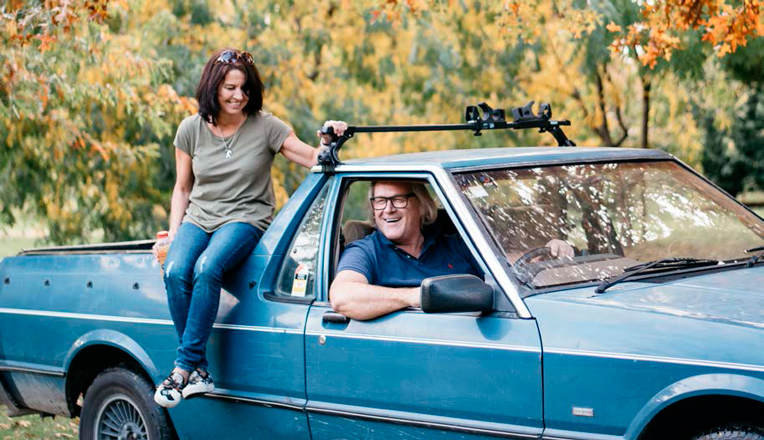Fruit loose & fancy

Ever wondered what happens to a perfectly juicy yet aesthetically sub-par apple? Ross Beaton, the founder of Hawke’s Bay juice company The Apple Press, certainly has. In fact, there is little Ross – who’s been in the apple industry most of his life – hasn’t thought of when it comes to his boutique fruit-pressing operation. Where others see scarred, scratched and pitted fruit, Ross, alongside food innovation specialist Sally Gallagher, sees a second chance for reject apples that were just going to waste. “That’s 13,000 tonnes a year,” he says. “I wanted to do something meaningful with that fruit – something that meant we weren’t literally dumping it.”
In the cool store of The Apple Press HQ, Ross talks a mile a minute about the techniques he’s implemented to give his products a head start on the competition. “Most juice companies treat apples the way your grandmother used to treat asparagus: cooked to within an inch of its life,” he explains.
“The apples are crushed, enzymes are added to them, all the water and oils are drawn out until what’s left is a syrup that’s mixed with tap water to make it ‘juice’. The fruit’s lost all its integrity.”
Even though it’s minus 1-2°C near the pre-coolers in the storage chiller, Ross is all fired up about his company vision. “This,” he says, gesturing to an imposing stack of apple crates, “is what it feels like to be a freshly picked apple. We press the apple once, to capture all of the flavour and aromas of that apple. It’s then blanched for a couple of seconds and bottled. And that’s it.”
“ You can not only trace all of these apples to Hawke’s Bay,
but to the exact orchard they came from ”
The Apple Press aims to champion apple varieties in the same way the wine industry distinguishes between a peppery shiraz and a crisp sauvignon blanc. When reaching for a bottle of its apple juice, you can take your pick between Jazz, Braeburn and Royal Gala varieties. Each has its own distinctive flavour and Sally attests to the provenance of every variety. “We have a wonderful, authentic juice,” she says. “You can not only trace all of these apples to Hawke’s Bay, but to the exact orchard they came from. And we also have a really sustainable product, in fully recyclable packaging, that is lower in natural sugar than juices made from concentrate.”
The decision to use recycled plastic over glass bottles was carefully considered. “There were a few reasons,” explains Sally. “Consumer convenience, our ability to be innovative so we can create bottles in all shapes and sizes, and the fact that the recycling of plastic uses less energy than glass… but fundamentally, our purpose is to share the pleasure of drinking a Hawke’s Bay apple with the world, and we cannot achieve that in a glass bottle.”
With new products being rolled out alongside the original line-up – think Braeburn & Valencia Orange, Royal Gala & New Zealand Feijoa and Braeburn & Hawke’s Bay Pear – Ross and Sally have their eyes on the export market, and this was the thinking behind building their own production facility in the Bay. The investment is proof of how much they value their product and their belief that the time is right for pure, homegrown juice that doesn’t contain any ‘nasties’.
Accustomed to fielding calls from prospective producers, Sally knew from the get-go that there was something different about what Ross was planning. “Living in Hawke’s Bay, I’ve become used to people ringing me up and saying, ‘Hey, Sally, I’ve got these cherries…’ or ‘I have these peaches…’”
But once she was in, it was full steam ahead. Five years on, the hard work is finally coming to, er, fruition.“The things that make food production challenging had to be worked through – things like shelf life and food regulations,” explains Sally. “That’s my job – making sure those things are covered.”
It’s a work ethic Ross admires and he also has high praise for Sally’s great sense of humour, something he clearly possesses himself. The combination makes for a fun workplace.
“He always guarantees a dynamic work environment,” confirms Sally. “Just when you think you may be approaching ‘business as usual’ you are gently reminded that you are miles away!”
Article taken from Nadia Lim Magazine